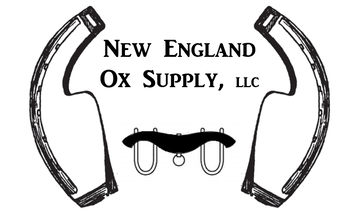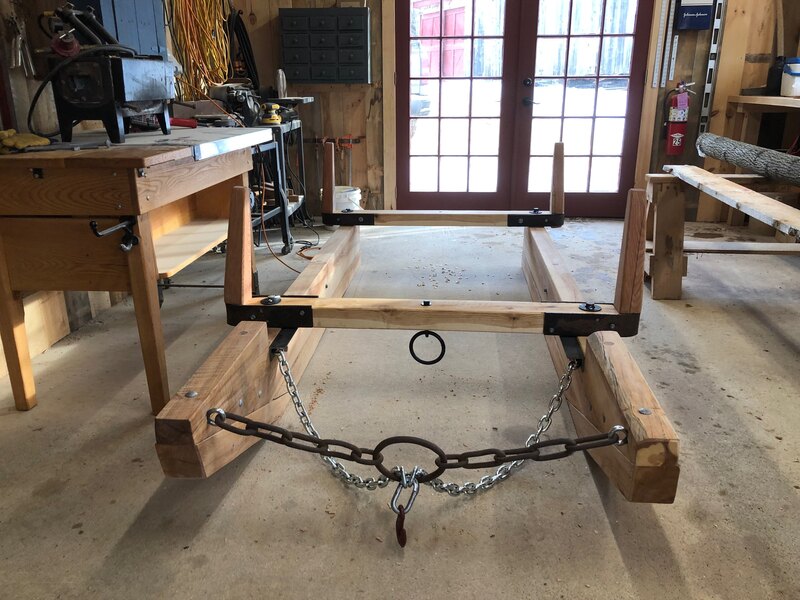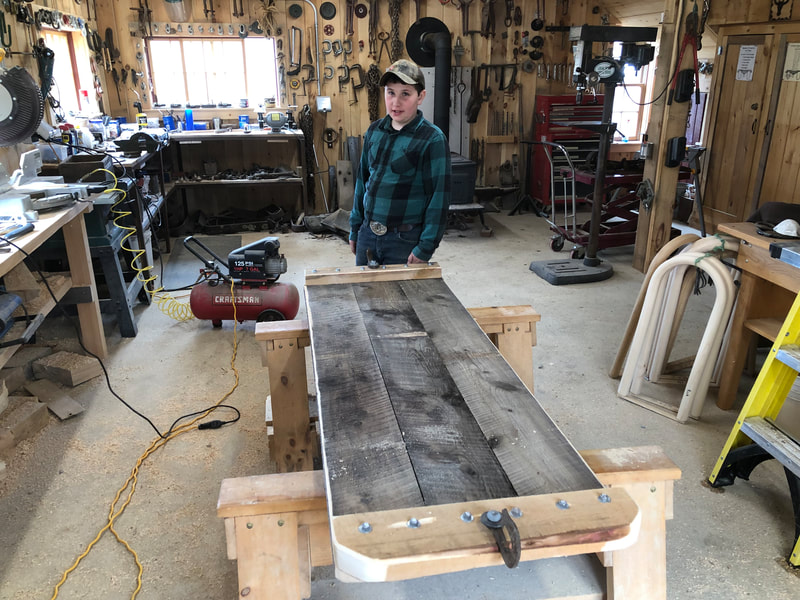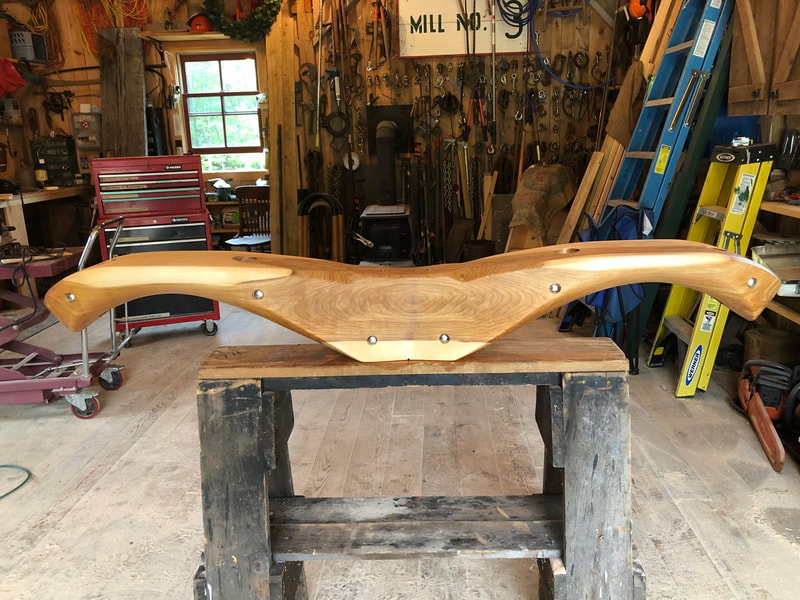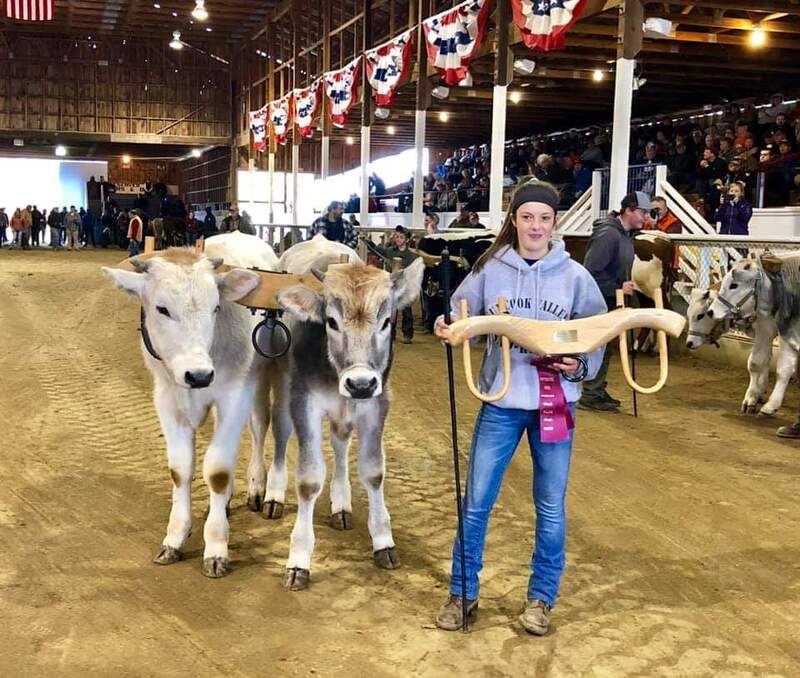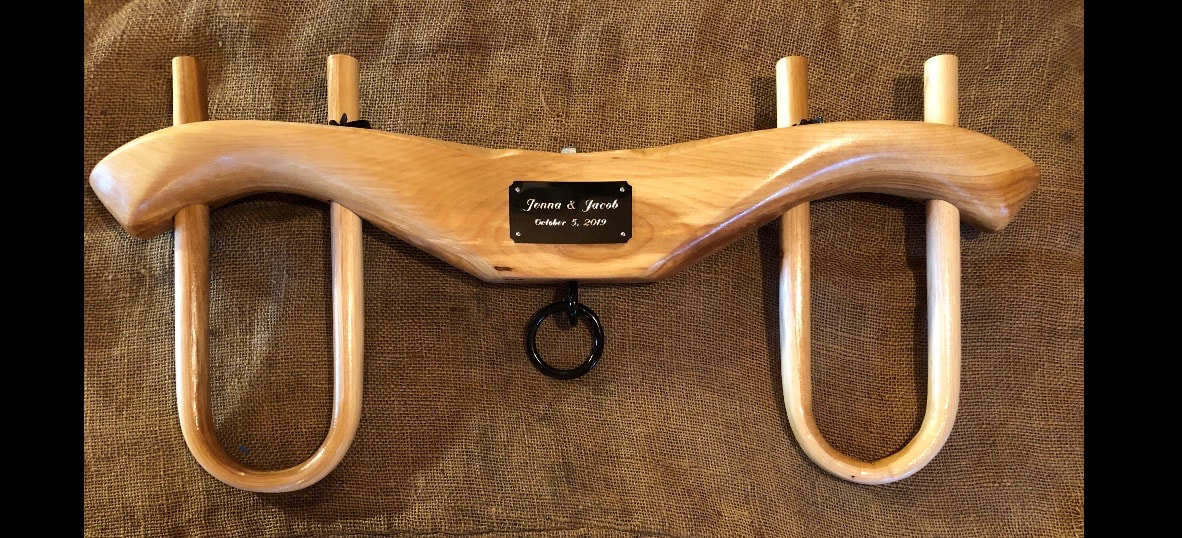We custom build ox yokes, carts, sleds, scoots, stone boats, and other draft animal equipment.
We are fortunate to have several family members who are professional loggers. Over the years they have come to know what we look for in respect to species and quality as it pertains to its respective use.
The New England forests offer us a large selection of softwoods and hardwoods well suited for our many uses. A logging scoot for example is built using three different hardwood species. The runners are Ash, the bunks and stakes are Red Oak, and the shoes are Rock Maple or Beech.
We purchase much of our yoke stock from a family owned log concentration yard in Northern Vermont. Due to the short growing season in northern New England, the Yellow Birches grow at a slow pace. The small, tight growth rings are beneficial to making a strong ox yoke.
We choose good quality logs and Tim oversees the milling of each log. Our primary sawyer is a long time ox man and horseman; therefore, he is well suited to get the right piece out of the log.
In most every case, we select and saw the wood needed for a project, after we have consulted with the customer.
We are fortunate to have several family members who are professional loggers. Over the years they have come to know what we look for in respect to species and quality as it pertains to its respective use.
The New England forests offer us a large selection of softwoods and hardwoods well suited for our many uses. A logging scoot for example is built using three different hardwood species. The runners are Ash, the bunks and stakes are Red Oak, and the shoes are Rock Maple or Beech.
We purchase much of our yoke stock from a family owned log concentration yard in Northern Vermont. Due to the short growing season in northern New England, the Yellow Birches grow at a slow pace. The small, tight growth rings are beneficial to making a strong ox yoke.
We choose good quality logs and Tim oversees the milling of each log. Our primary sawyer is a long time ox man and horseman; therefore, he is well suited to get the right piece out of the log.
In most every case, we select and saw the wood needed for a project, after we have consulted with the customer.
Smooth Side to the Ox
Animal comfort is of great importance. We strive to supply equipment for our customers that supports this belief. Some examples are:
Animal comfort is of great importance. We strive to supply equipment for our customers that supports this belief. Some examples are:
- When ordering leather neck straps, halters, and breeching, we require that our manufacturers either use stitching to assemble the products or if rivets are needed, be sure that the smooth end of the rivet comes in contact with the animal.
- Our custom built ox yokes have chamfered edges (which also reduces the likelihood of edge checking), countersunk reinforcement bolts, and de-burred slide plate assemblies. And, most importantly, we take great pains to form a comfortable neck seat.
Used Yokes
If you would like to order a used yoke, please call Tim directly
at 603-568-7388 to discuss what you are looking for.
For information on what we look for when purchasing used yokes to resell, please visit the
"We Buy Used Equipment" page, and then call Tim if you have one to sell. Thank you!
Equipment Repair
We have the expertise, and the tooling, to repair and refurbish ox yokes, sleds, scoots, forecarts, ox carts, stoneboats, and all manner of draft animal drawn cultivation equipment. High quality hard and softwood logs are chosen and milled under Tim's supervision to produce the wooden repair parts for each project. The customer has the choice of finishes. Among the finishes are paint, Linseed Oil, Polyurethane, and more.
In the event that metal replacement parts are needed, we have accomplished welders, fabricators, and blacksmiths ready to help us out.
Please do not hesitate to call Tim at 603-568-7388 to discuss your project.
Here are some recent equipment projects built by Tim, check back for background info and details on each project as we get them added to the website.
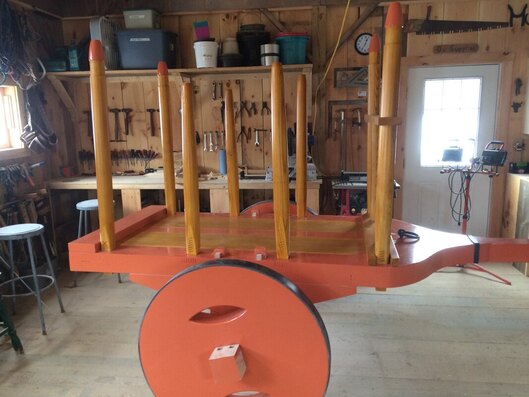
This traditional Portuguese Ox Cart was custom built for our friend and longtime customer Joe Tavares of Hudson Massachusetts. Joe's father, grandfather, and generations before made their living as ox teamsters doing all sorts of work on farms, in vineyards, on roads, etc. When Joe moved to America in the early 1970's from the Santa Maria Island in the Azores, his father Tiago, was still making his living as a teamster. Joe is but one of many accomplished ox men that came here from mainland Portugal and the Islands. They are keeping the heritage alive.
The lumber used to build the cart was logged and milled by the late Les Barden, ox and horse teamster also of Farmington.
Tim and Master Woodworker Doug Ham of Rochester, New Hampshire spent a couple hundred hours building this piece. Both power tools and traditional hand tools were used to their best advantage. All of the joints are mortised and tenoned. The stakes were turned on a 6' lathe.
The steel tires were 'hot' mounted onto the wooden wheels by Wheelwright Lee Sawyer of Jaffrey, N.H.
All of the iron parts are hand forged and were made by Russell Pope of Elements in Steel Forge, located in Newmarket, N.H.
Tim also builds traditional Portuguese ox yokes for Joe and others.
Note: When Joe left the island of Santa Maria the were only a few cars and trucks being used. Horses and oxen were supplying much of the traction power for work and transportation. There was no electricity or plumbing in their home. Doesn't this ring familiar as to how life was in America early in the twentieth century?
I hope to one day have time to sit with Joe and learn more about his, and his dads early lives. And, if so, I will share the stories with you folks.
The lumber used to build the cart was logged and milled by the late Les Barden, ox and horse teamster also of Farmington.
Tim and Master Woodworker Doug Ham of Rochester, New Hampshire spent a couple hundred hours building this piece. Both power tools and traditional hand tools were used to their best advantage. All of the joints are mortised and tenoned. The stakes were turned on a 6' lathe.
The steel tires were 'hot' mounted onto the wooden wheels by Wheelwright Lee Sawyer of Jaffrey, N.H.
All of the iron parts are hand forged and were made by Russell Pope of Elements in Steel Forge, located in Newmarket, N.H.
Tim also builds traditional Portuguese ox yokes for Joe and others.
Note: When Joe left the island of Santa Maria the were only a few cars and trucks being used. Horses and oxen were supplying much of the traction power for work and transportation. There was no electricity or plumbing in their home. Doesn't this ring familiar as to how life was in America early in the twentieth century?
I hope to one day have time to sit with Joe and learn more about his, and his dads early lives. And, if so, I will share the stories with you folks.
